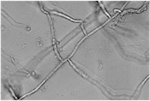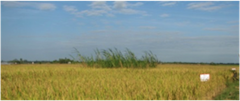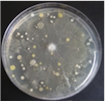Microbial biofertilizers for improved crop availability of phosphorus from soil and waste (MiCroP)



Phosphorus is an essential non-renewable nutrient and insufficient P supply limits plant production in many soils. All P fertilizers are currently derived from rock phosphates, which will become exhausted within the next 100 years, with no biological or technological substitutes. Concurrently, growing amounts of P-rich organic wastes are not intelligently utilized. Consequently, we need to develop novel agricultural approaches, which also address the fertilizing value of recycled wastes to provide P for sustainable production of food and feed to meet future food demand of a growing world population.
By combining novel isolation strategies with state of the art omics technologies (genomics, transcriptomics and mobilomics), the mechanisms for phosphate mobilization under in situ conditions are investigated. These microbial mechanisms studies are complemented by investigations of actual plant P uptake and performance. Basic understanding of these underlying mechanisms is pivotal for a robust and reliable exploitation of microorganisms for the use as biofertilizers.
Project Partners
- University of Copenhagen - Department of plant and Environmental Sciences
- The Technical University of Denmark (DTU)
- Novozymes A/S, BioAg DivisionKnowledge Center for Agriculture
Key Papers
- Paulin, M; Nicolaisen, MH; Jacobsen, CS; Gimsing, AL; Sørensen, J and Bælum, J. 2013 Improving Griffith’s protocol for co-extraction of microbial DNA and RNA in adsorptive soils. Soil Biology & Biochemistry 63: 37-49



